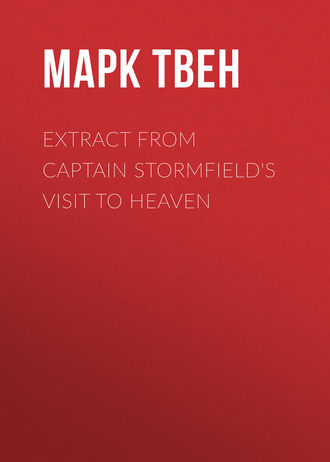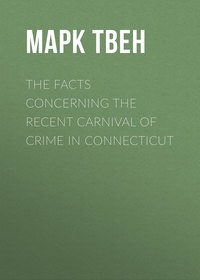 полная версия
полная версияПолная версия
Extract from Captain Stormfield's Visit to Heaven
“Don’t break my heart,” says I; “I’m getting low-spirited enough already.”
After another long silence, says he —
“Are you glad to be here?”
Says I, “Old man, I’ll be frank with you. This ain’t just as near my idea of bliss as I thought it was going to be, when I used to go to church.”
Says he, “What do you say to knocking off and calling it half a day?”
“That’s me,” says I. “I never wanted to get off watch so bad in my life.”
So we started. Millions were coming to the cloud-bank all the time, happy and hosannahing; millions were leaving it all the time, looking mighty quiet, I tell you. We laid for the new-comers, and pretty soon I’d got them to hold all my things a minute, and then I was a free man again and most outrageously happy. Just then I ran across old Sam Bartlett, who had been dead a long time, and stopped to have a talk with him. Says I —
“Now tell me – is this to go on forever? Ain’t there anything else for a change?”
Says he —
“I’ll set you right on that point very quick. People take the figurative language of the Bible and the allegories for literal, and the first thing they ask for when they get here is a halo and a harp, and so on. Nothing that’s harmless and reasonable is refused a body here, if he asks it in the right spirit. So they are outfitted with these things without a word. They go and sing and play just about one day, and that’s the last you’ll ever see them in the choir. They don’t need anybody to tell them that that sort of thing wouldn’t make a heaven – at least not a heaven that a sane man could stand a week and remain sane. That cloud-bank is placed where the noise can’t disturb the old inhabitants, and so there ain’t any harm in letting everybody get up there and cure himself as soon as he comes.
“Now you just remember this – heaven is as blissful and lovely as it can be; but it’s just the busiest place you ever heard of. There ain’t any idle people here after the first day. Singing hymns and waving palm branches through all eternity is pretty when you hear about it in the pulpit, but it’s as poor a way to put in valuable time as a body could contrive. It would just make a heaven of warbling ignoramuses, don’t you see? Eternal Rest sounds comforting in the pulpit, too. Well, you try it once, and see how heavy time will hang on your hands. Why, Stormfield, a man like you, that had been active and stirring all his life, would go mad in six months in a heaven where he hadn’t anything to do. Heaven is the very last place to come to rest in, – and don’t you be afraid to bet on that!”
Says I —
“Sam, I’m as glad to hear it as I thought I’d be sorry. I’m glad I come, now.”
Says he —
“Cap’n, ain’t you pretty physically tired?”
Says I —
“Sam, it ain’t any name for it! I’m dog-tired.”
“Just so – just so. You’ve earned a good sleep, and you’ll get it. You’ve earned a good appetite, and you’ll enjoy your dinner. It’s the same here as it is on earth – you’ve got to earn a thing, square and honest, before you enjoy it. You can’t enjoy first and earn afterwards. But there’s this difference, here: you can choose your own occupation, and all the powers of heaven will be put forth to help you make a success of it, if you do your level best. The shoemaker on earth that had the soul of a poet in him won’t have to make shoes here.”
“Now that’s all reasonable and right,” says I. “Plenty of work, and the kind you hanker after; no more pain, no more suffering – ”
“Oh, hold on; there’s plenty of pain here – but it don’t kill. There’s plenty of suffering here, but it don’t last. You see, happiness ain’t a thing in itself– it’s only a contrast with something that ain’t pleasant. That’s all it is. There ain’t a thing you can mention that is happiness in its own self – it’s only so by contrast with the other thing. And so, as soon as the novelty is over and the force of the contrast dulled, it ain’t happiness any longer, and you have to get something fresh. Well, there’s plenty of pain and suffering in heaven – consequently there’s plenty of contrasts, and just no end of happiness.”
Says I, “It’s the sensiblest heaven I’ve heard of yet, Sam, though it’s about as different from the one I was brought up on as a live princess is different from her own wax figger.”
Along in the first months I knocked around about the Kingdom, making friends and looking at the country, and finally settled down in a pretty likely region, to have a rest before taking another start. I went on making acquaintances and gathering up information. I had a good deal of talk with an old bald-headed angel by the name of Sandy McWilliams. He was from somewhere in New Jersey. I went about with him, considerable. We used to lay around, warm afternoons, in the shade of a rock, on some meadow-ground that was pretty high and out of the marshy slush of his cranberry-farm, and there we used to talk about all kinds of things, and smoke pipes. One day, says I —
“About how old might you be, Sandy?”
“Seventy-two.”
“I judged so. How long you been in heaven?”
“Twenty-seven years, come Christmas.”
“How old was you when you come up?”
“Why, seventy-two, of course.”
“You can’t mean it!”
“Why can’t I mean it?”
“Because, if you was seventy-two then, you are naturally ninety-nine now.”
“No, but I ain’t. I stay the same age I was when I come.”
“Well,” says I, “come to think, there’s something just here that I want to ask about. Down below, I always had an idea that in heaven we would all be young, and bright, and spry.”
“Well, you can be young if you want to. You’ve only got to wish.”
“Well, then, why didn’t you wish?”
“I did. They all do. You’ll try it, some day, like enough; but you’ll get tired of the change pretty soon.”
“Why?”
“Well, I’ll tell you. Now you’ve always been a sailor; did you ever try some other business?”
“Yes, I tried keeping grocery, once, up in the mines; but I couldn’t stand it; it was too dull – no stir, no storm, no life about it; it was like being part dead and part alive, both at the same time. I wanted to be one thing or t’other. I shut up shop pretty quick and went to sea.”
“That’s it. Grocery people like it, but you couldn’t. You see you wasn’t used to it. Well, I wasn’t used to being young, and I couldn’t seem to take any interest in it. I was strong, and handsome, and had curly hair, – yes, and wings, too! – gay wings like a butterfly. I went to picnics and dances and parties with the fellows, and tried to carry on and talk nonsense with the girls, but it wasn’t any use; I couldn’t take to it – fact is, it was an awful bore. What I wanted was early to bed and early to rise, and something to do; and when my work was done, I wanted to sit quiet, and smoke and think – not tear around with a parcel of giddy young kids. You can’t think what I suffered whilst I was young.”
“How long was you young?”
“Only two weeks. That was plenty for me. Laws, I was so lonesome! You see, I was full of the knowledge and experience of seventy-two years; the deepest subject those young folks could strike was only a-b-c to me. And to hear them argue – oh, my! it would have been funny, if it hadn’t been so pitiful. Well, I was so hungry for the ways and the sober talk I was used to, that I tried to ring in with the old people, but they wouldn’t have it. They considered me a conceited young upstart, and gave me the cold shoulder. Two weeks was a-plenty for me. I was glad to get back my bald head again, and my pipe, and my old drowsy reflections in the shade of a rock or a tree.”
“Well,” says I, “do you mean to say you’re going to stand still at seventy-two, forever?”
“I don’t know, and I ain’t particular. But I ain’t going to drop back to twenty-five any more – I know that, mighty well. I know a sight more than I did twenty-seven years ago, and I enjoy learning, all the time, but I don’t seem to get any older. That is, bodily – my mind gets older, and stronger, and better seasoned, and more satisfactory.”
Says I, “If a man comes here at ninety, don’t he ever set himself back?”
“Of course he does. He sets himself back to fourteen; tries it a couple of hours, and feels like a fool; sets himself forward to twenty; it ain’t much improvement; tries thirty, fifty, eighty, and finally ninety – finds he is more at home and comfortable at the same old figure he is used to than any other way. Or, if his mind begun to fail him on earth at eighty, that’s where he finally sticks up here. He sticks at the place where his mind was last at its best, for there’s where his enjoyment is best, and his ways most set and established.”
“Does a chap of twenty-five stay always twenty-five, and look it?”
“If he is a fool, yes. But if he is bright, and ambitious and industrious, the knowledge he gains and the experiences he has, change his ways and thoughts and likings, and make him find his best pleasure in the company of people above that age; so he allows his body to take on that look of as many added years as he needs to make him comfortable and proper in that sort of society; he lets his body go on taking the look of age, according as he progresses, and by and by he will be bald and wrinkled outside, and wise and deep within.”
“Babies the same?”
“Babies the same. Laws, what asses we used to be, on earth, about these things! We said we’d be always young in heaven. We didn’t say how young – we didn’t think of that, perhaps – that is, we didn’t all think alike, anyway. When I was a boy of seven, I suppose I thought we’d all be twelve, in heaven; when I was twelve, I suppose I thought we’d all be eighteen or twenty in heaven; when I was forty, I begun to go back; I remember I hoped we’d all be about thirty years old in heaven. Neither a man nor a boy ever thinks the age he has is exactly the best one – he puts the right age a few years older or a few years younger than he is. Then he makes that ideal age the general age of the heavenly people. And he expects everybody to stick at that age – stand stock-still – and expects them to enjoy it! – Now just think of the idea of standing still in heaven! Think of a heaven made up entirely of hoop-rolling, marble-playing cubs of seven years! – or of awkward, diffident, sentimental immaturities of nineteen! – or of vigorous people of thirty, healthy-minded, brimming with ambition, but chained hand and foot to that one age and its limitations like so many helpless galley-slaves! Think of the dull sameness of a society made up of people all of one age and one set of looks, habits, tastes and feelings. Think how superior to it earth would be, with its variety of types and faces and ages, and the enlivening attrition of the myriad interests that come into pleasant collision in such a variegated society.”
“Look here,” says I, “do you know what you’re doing?”
“Well, what am I doing?”
“You are making heaven pretty comfortable in one way, but you are playing the mischief with it in another.”
“How d’you mean?”
“Well,” I says, “take a young mother that’s lost her child, and – ”
“Sh!” he says. “Look!”
It was a woman. Middle-aged, and had grizzled hair. She was walking slow, and her head was bent down, and her wings hanging limp and droopy; and she looked ever so tired, and was crying, poor thing! She passed along by, with her head down, that way, and the tears running down her face, and didn’t see us. Then Sandy said, low and gentle, and full of pity:
“She’s hunting for her child! No, found it, I reckon. Lord, how she’s changed! But I recognized her in a minute, though it’s twenty-seven years since I saw her. A young mother she was, about twenty two or four, or along there; and blooming and lovely and sweet? oh, just a flower! And all her heart and all her soul was wrapped up in her child, her little girl, two years old. And it died, and she went wild with grief, just wild! Well, the only comfort she had was that she’d see her child again, in heaven – ‘never more to part,’ she said, and kept on saying it over and over, ‘never more to part.’ And the words made her happy; yes, they did; they made her joyful, and when I was dying, twenty-seven years ago, she told me to find her child the first thing, and say she was coming – ‘soon, soon, very soon, she hoped and believed!’”
“Why, it’s pitiful, Sandy.”
He didn’t say anything for a while, but sat looking at the ground, thinking. Then he says, kind of mournful:
“And now she’s come!”
“Well? Go on.”
“Stormfield, maybe she hasn’t found the child, but I think she has. Looks so to me. I’ve seen cases before. You see, she’s kept that child in her head just the same as it was when she jounced it in her arms a little chubby thing. But here it didn’t elect to stay a child. No, it elected to grow up, which it did. And in these twenty-seven years it has learned all the deep scientific learning there is to learn, and is studying and studying and learning and learning more and more, all the time, and don’t give a damn for anything but learning; just learning, and discussing gigantic problems with people like herself.”
“Well?”
“Stormfield, don’t you see? Her mother knows cranberries, and how to tend them, and pick them, and put them up, and market them; and not another blamed thing! Her and her daughter can’t be any more company for each other now than mud turtle and bird o’ paradise. Poor thing, she was looking for a baby to jounce; I think she’s struck a disapp’intment.”
“Sandy, what will they do – stay unhappy forever in heaven?”
“No, they’ll come together and get adjusted by and by. But not this year, and not next. By and by.”
CHAPTER II
I had been having considerable trouble with my wings. The day after I helped the choir I made a dash or two with them, but was not lucky. First off, I flew thirty yards, and then fouled an Irishman and brought him down – brought us both down, in fact. Next, I had a collision with a Bishop – and bowled him down, of course. We had some sharp words, and I felt pretty cheap, to come banging into a grave old person like that, with a million strangers looking on and smiling to themselves.
I saw I hadn’t got the hang of the steering, and so couldn’t rightly tell where I was going to bring up when I started. I went afoot the rest of the day, and let my wings hang. Early next morning I went to a private place to have some practice. I got up on a pretty high rock, and got a good start, and went swooping down, aiming for a bush a little over three hundred yards off; but I couldn’t seem to calculate for the wind, which was about two points abaft my beam. I could see I was going considerable to looard of the bush, so I worked my starboard wing slow and went ahead strong on the port one, but it wouldn’t answer; I could see I was going to broach to, so I slowed down on both, and lit. I went back to the rock and took another chance at it. I aimed two or three points to starboard of the bush – yes, more than that – enough so as to make it nearly a head-wind. I done well enough, but made pretty poor time. I could see, plain enough, that on a head-wind, wings was a mistake. I could see that a body could sail pretty close to the wind, but he couldn’t go in the wind’s eye. I could see that if I wanted to go a-visiting any distance from home, and the wind was ahead, I might have to wait days, maybe, for a change; and I could see, too, that these things could not be any use at all in a gale; if you tried to run before the wind, you would make a mess of it, for there isn’t anyway to shorten sail – like reefing, you know – you have to take it all in – shut your feathers down flat to your sides. That would land you, of course. You could lay to, with your head to the wind – that is the best you could do, and right hard work you’d find it, too. If you tried any other game, you would founder, sure.
I judge it was about a couple of weeks or so after this that I dropped old Sandy McWilliams a note one day – it was a Tuesday – and asked him to come over and take his manna and quails with me next day; and the first thing he did when he stepped in was to twinkle his eye in a sly way, and say, —
“Well, Cap, what you done with your wings?”
I saw in a minute that there was some sarcasm done up in that rag somewheres, but I never let on. I only says, —
“Gone to the wash.”
“Yes,” he says, in a dry sort of way, “they mostly go to the wash – about this time – I’ve often noticed it. Fresh angels are powerful neat. When do you look for ’em back?”
“Day after to-morrow,” says I.
He winked at me, and smiled.
Says I, —
“Sandy, out with it. Come – no secrets among friends. I notice you don’t ever wear wings – and plenty others don’t. I’ve been making an ass of myself – is that it?”
“That is about the size of it. But it is no harm. We all do it at first. It’s perfectly natural. You see, on earth we jump to such foolish conclusions as to things up here. In the pictures we always saw the angels with wings on – and that was all right; but we jumped to the conclusion that that was their way of getting around – and that was all wrong. The wings ain’t anything but a uniform, that’s all. When they are in the field – so to speak, – they always wear them; you never see an angel going with a message anywhere without his wings, any more than you would see a military officer presiding at a court-martial without his uniform, or a postman delivering letters, or a policeman walking his beat, in plain clothes. But they ain’t to fly with! The wings are for show, not for use. Old experienced angels are like officers of the regular army – they dress plain, when they are off duty. New angels are like the militia – never shed the uniform – always fluttering and floundering around in their wings, butting people down, flapping here, and there, and everywhere, always imagining they are attracting the admiring eye – well, they just think they are the very most important people in heaven. And when you see one of them come sailing around with one wing tipped up and t’other down, you make up your mind he is saying to himself: ‘I wish Mary Ann in Arkansaw could see me now. I reckon she’d wish she hadn’t shook me.’ No, they’re just for show, that’s all – only just for show.”
“I judge you’ve got it about right, Sandy,” says I.
“Why, look at it yourself,” says he. “You ain’t built for wings – no man is. You know what a grist of years it took you to come here from the earth – and yet you were booming along faster than any cannon-ball could go. Suppose you had to fly that distance with your wings – wouldn’t eternity have been over before you got here? Certainly. Well, angels have to go to the earth every day – millions of them – to appear in visions to dying children and good people, you know – it’s the heft of their business. They appear with their wings, of course, because they are on official service, and because the dying persons wouldn’t know they were angels if they hadn’t wings – but do you reckon they fly with them? It stands to reason they don’t. The wings would wear out before they got half-way; even the pin-feathers would be gone; the wing frames would be as bare as kite sticks before the paper is pasted on. The distances in heaven are billions of times greater; angels have to go all over heaven every day; could they do it with their wings alone? No, indeed; they wear the wings for style, but they travel any distance in an instant by wishing. The wishing-carpet of the Arabian Nights was a sensible idea – but our earthly idea of angels flying these awful distances with their clumsy wings was foolish.
“Our young saints, of both sexes, wear wings all the time – blazing red ones, and blue and green, and gold, and variegated, and rainbowed, and ring-streaked-and-striped ones – and nobody finds fault. It is suitable to their time of life. The things are beautiful, and they set the young people off. They are the most striking and lovely part of their outfit – a halo don’t begin.”
“Well,” says I, “I’ve tucked mine away in the cupboard, and I allow to let them lay there till there’s mud.”
“Yes – or a reception.”
“What’s that?”
“Well, you can see one to-night if you want to. There’s a barkeeper from Jersey City going to be received.”
“Go on – tell me about it.”
“This barkeeper got converted at a Moody and Sankey meeting, in New York, and started home on the ferry-boat, and there was a collision and he got drowned. He is of a class that think all heaven goes wild with joy when a particularly hard lot like him is saved; they think all heaven turns out hosannahing to welcome them; they think there isn’t anything talked about in the realms of the blest but their case, for that day. This barkeeper thinks there hasn’t been such another stir here in years, as his coming is going to raise. – And I’ve always noticed this peculiarity about a dead barkeeper – he not only expects all hands to turn out when he arrives, but he expects to be received with a torchlight procession.”
“I reckon he is disappointed, then.”
“No, he isn’t. No man is allowed to be disappointed here. Whatever he wants, when he comes – that is, any reasonable and unsacrilegious thing – he can have. There’s always a few millions or billions of young folks around who don’t want any better entertainment than to fill up their lungs and swarm out with their torches and have a high time over a barkeeper. It tickles the barkeeper till he can’t rest, it makes a charming lark for the young folks, it don’t do anybody any harm, it don’t cost a rap, and it keeps up the place’s reputation for making all comers happy and content.”
“Very good. I’ll be on hand and see them land the barkeeper.”
“It is manners to go in full dress. You want to wear your wings, you know, and your other things.”
“Which ones?”
“Halo, and harp, and palm branch, and all that.”
“Well,” says I, “I reckon I ought to be ashamed of myself, but the fact is I left them laying around that day I resigned from the choir. I haven’t got a rag to wear but this robe and the wings.”
“That’s all right. You’ll find they’ve been raked up and saved for you. Send for them.”
“I’ll do it, Sandy. But what was it you was saying about unsacrilegious things, which people expect to get, and will be disappointed about?”
“Oh, there are a lot of such things that people expect and don’t get. For instance, there’s a Brooklyn preacher by the name of Talmage, who is laying up a considerable disappointment for himself. He says, every now and then in his sermons, that the first thing he does when he gets to heaven, will be to fling his arms around Abraham, Isaac and Jacob, and kiss them and weep on them. There’s millions of people down there on earth that are promising themselves the same thing. As many as sixty thousand people arrive here every single day, that want to run straight to Abraham, Isaac and Jacob, and hug them and weep on them. Now mind you, sixty thousand a day is a pretty heavy contract for those old people. If they were a mind to allow it, they wouldn’t ever have anything to do, year in and year out, but stand up and be hugged and wept on thirty-two hours in the twenty-four. They would be tired out and as wet as muskrats all the time. What would heaven be, to them? It would be a mighty good place to get out of – you know that, yourself. Those are kind and gentle old Jews, but they ain’t any fonder of kissing the emotional highlights of Brooklyn than you be. You mark my words, Mr. T.’s endearments are going to be declined, with thanks. There are limits to the privileges of the elect, even in heaven. Why, if Adam was to show himself to every new comer that wants to call and gaze at him and strike him for his autograph, he would never have time to do anything else but just that. Talmage has said he is going to give Adam some of his attentions, as well as A., I. and J. But he will have to change his mind about that.”
“Do you think Talmage will really come here?”
“Why, certainly, he will; but don’t you be alarmed; he will run with his own kind, and there’s plenty of them. That is the main charm of heaven – there’s all kinds here – which wouldn’t be the case if you let the preachers tell it. Anybody can find the sort he prefers, here, and he just lets the others alone, and they let him alone. When the Deity builds a heaven, it is built right, and on a liberal plan.”











